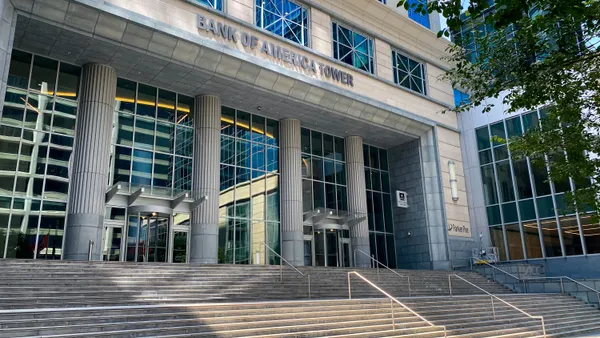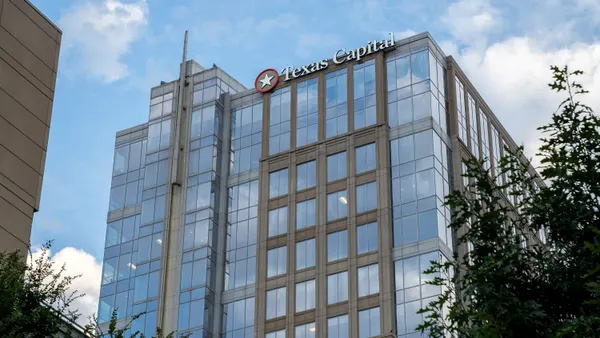First Interstate Bank CEO Jim Reuter is betting on the opportunity that comes through M&A disruption, particularly since his bank “looks a lot like FirstBank in terms of its asset size and how we operate.”
Reuter knows FirstBank firsthand: He spent 37 years at the Lakewood, Colorado-based lender, including seven as CEO, before moving on to become CEO of Billings, Montana-based First Interstate last November.
So naturally, Pittsburgh-based PNC’s proposed $4.1 billion acquisition of FirstBank on Sept. 8 piqued Reuter’s interest.
“There’ll be some clients and parts of Colorado that will like working with a larger bank, because of some of the capabilities that they can offer,” Reuter said in a recent interview. “But there'll be others that’ll go, ‘You know what? There's a missing medium-sized bank in Colorado.’”

Reuter said First Interstate is “excited that we can be an option for that.”
He also pointed to last year’s deal in which Kansas City-based UMB acquired Denver-based HTLF for $2.8 billion.
“People like to pick their bank, not have their bank picked for them through a change,” Reuter said.
For PNC’s part, CEO Bill Demchak – who has emphasized the need for greater scale – has said the super-regional “effectively bought Colorado” with the acquisition of FirstBank.
The deal gives $559 billion-asset PNC an additional $26.8 billion in assets and 95 branches, as well as 20% retail deposit share and 14% branch share in Denver. PNC plans to retain all of FirstBank’s branches and client-facing employees.
“The whole ethos we’re taking with this deal is continuity,” Alex Overstrom, PNC’s head of retail banking, told Banking Dive this week, emphasizing the similarities between the super-regional and the Colorado-based lender. “We’re aiming for as smooth a transition as possible. It's all about keeping the relationships, keeping those client-facing folks, and I feel quite confident in our ability to do that.”
But Colorado-area lenders see an opening. For $27.6 billion-asset First Interstate to expand in Colorado, the right team and products are key, Reuter said. The bank’s current market share in Colorado – where it has about 20 of its roughly 300 branches – is just 0.2%, offering lots of room to grow, he noted. He declined to provide a growth projection.
Reuter is also counting on the chance to pick up talent in the state, although he declined to provide a specific number of expected hires. First Interstate employed close to 3,500 people as of the end of last year.
“When there's change, people tend to look around and go, ‘OK, here's an opportunity for me,’” he said. Earlier in Reuter’s career, as smaller, local lenders were swallowed by Wells Fargo or U.S. Bank, “when they changed names, we saw significant opportunity, and this is no different.”
With its Rocky Mountain region foothold, First Interstate has the No. 2 market share in Montana and No. 1 in Wyoming, Reuter said, and a presence in fast-growing areas such as Boise and Coeur d'Alene, Idaho. The bank’s footprint stretches across 12 states, from Washington to Iowa.
“We have a good understanding of what these markets desire and want from a service standpoint,” Reuter said, noting the importance of tourism and hospitality to the Rocky Mountain region. “When the top leadership lives in the region, you have a different pulse on what that region needs.”
Since Reuter arrived at First Interstate, he’s sought to tighten the bank’s focus. When he took the helm of the company late last year, he saw “a bank that was maybe a mile wide and an inch deep.”
First Interstate exited indirect auto lending and turned to a partner for consumer credit cards, and has leaned into technology solutions that give a midsize bank larger lending capabilities.
“There’s this whole conversation around scale, but I'd actually argue there's getting to be more options of vendors and partners to fill those technology voids,” he said, “yet you're small enough to operate a little bit more relationship-oriented, little more community-oriented, and compete with the smaller banks.”
In narrowing its focus, the bank also exited Arizona and Kansas City, where it lacked brand density compared to other areas it serves, Reuter said.
But First Interstate remained in Colorado, seeing it “as a strategic opportunity,” he said.
With the PNC-FirstBank deal, Reuter said, the state “just became even a better opportunity for us.”











